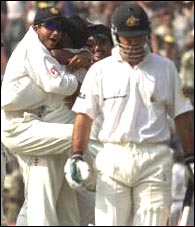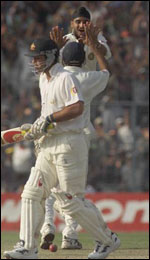

Deferred judgement
Daniel Laidlaw
The last frontier is a more daunting environment than it appeared. Having had the ultimate conquest ripped from their grasp, the Australians have just two days to pick up the pieces of a shattering defeat and regroup for an assault on a team that has transformed from a faltering underdog into a formidable foe.
Now that the streak is over, India presents a different kind of challenge. Australia, having just experienced its own fallibility for the first time in 16 matches, has the unfamiliar assignment of rebounding from a loss. Not just any loss, but one that has undermined the tantalisingly elusive goal it set for itself: a series victory in India.
With the unshakeable self-belief having proved insufficient to salvage a draw, does Australia's confidence remain high enough to fight back and defeat a rampaging opponent in a triumph destiny seems determined to deny them? The answer will be found in Chennai.
 India is known as a team that can dominate from the front. That was evident on the final day with a vociferous crowd behind it. Now that it has also proved its resilience in coming from behind, it's bound to have a psychological affect on both teams. Australia knows all too well the belief injected by a seemingly impossible triumph. The second Test against Pakistan two years ago was a pivotal moment in their victory sequence. Achieving the second-highest run chase of all time gave it a belief that anything was possible, that it could win from any position. Now the reverse applies. It has experienced that it can lose from anywhere, too, and is never safe no matter how impregnable the position. Not only that, but it is facing an opponent which has just gained that same invaluable knowledge that victory is always possible.
India is known as a team that can dominate from the front. That was evident on the final day with a vociferous crowd behind it. Now that it has also proved its resilience in coming from behind, it's bound to have a psychological affect on both teams. Australia knows all too well the belief injected by a seemingly impossible triumph. The second Test against Pakistan two years ago was a pivotal moment in their victory sequence. Achieving the second-highest run chase of all time gave it a belief that anything was possible, that it could win from any position. Now the reverse applies. It has experienced that it can lose from anywhere, too, and is never safe no matter how impregnable the position. Not only that, but it is facing an opponent which has just gained that same invaluable knowledge that victory is always possible.
Well, it wasn't supposed to be easy. This series loomed as Australia's toughest challenge for at least two years, and it's exceeded expectations. The most demanding test of character and resolve has duly arrived and the team's place in history will be judged on how it responds. When looking back in years to come, it's likely we will say either two things: Yes, Australia created a world record, but it can not be considered great since it could not pass the final test of great teams: gaining strength from the adversity of defeat. Alternatively, we will say it proved it is one of the great teams, for after losing in the most remarkable fashion imaginable, it came back and achieved its most coveted triumph anyway. That is the mark of a champion team.
Whatever happens, the series has already ensured its place in history as one that will be remembered for its special achievements, if not closeness of results. For India, there is the record comeback inspired by the first hat-trick and highest score by an Indian. For Australia, the series in which its record sequence was halted and how its status was defined.
It is fitting from an aesthetic point of view that the streak ended with the finality of a loss rather than a draw. Once the match turned against Australia it was at a loss for answers. Unused to playing for a draw, it lacked a sense of direction in attempting to see out the match. Even entering the final session, there did not appear to be a conviction about playing only to preserve the status quo, that a miracle couldn't be produced. Justin Langer, for one, did not bat like a fighter with a long stay on his mind. Perhaps he figured he wouldn't last batting defensively against the turning ball, so may as well put some of the pressure back on the bowlers and create some breathing space around the bat. It was a bold, commendable approach…until he got out after facing just 21 balls.
Steve Waugh, too, proved that he does not always rise to the occasion. He's a master at leading the rearguard action in the first innings, but has no noteworthy efforts of saving his side in the second innings. It's merely an observation, not a criticism, as nobody can be expected to do the hard work all the time. Just ask Tendulkar.
 This was an occasion for someone else to stand tall, to show a different kind of spirit. Not leading a charge to a victory, but humbly averting defeat. In time, Ricky Ponting should come to be regarded as one of the world's elite batsmen. In terms of leading the batting, he's in line to be the next Steve Waugh. But on this tour he has regressed somewhat, and will be another Australian looking to redeem his series in the third Test. He is an accomplished player of spin, but seems to have a block when it comes to facing Harbhajan. His timid standing sweep betrayed a lack of confidence, uncustomary from an Australian batsman in recent times. He's proven his mental resilience before and it would come as no surprise to see him do it again.
This was an occasion for someone else to stand tall, to show a different kind of spirit. Not leading a charge to a victory, but humbly averting defeat. In time, Ricky Ponting should come to be regarded as one of the world's elite batsmen. In terms of leading the batting, he's in line to be the next Steve Waugh. But on this tour he has regressed somewhat, and will be another Australian looking to redeem his series in the third Test. He is an accomplished player of spin, but seems to have a block when it comes to facing Harbhajan. His timid standing sweep betrayed a lack of confidence, uncustomary from an Australian batsman in recent times. He's proven his mental resilience before and it would come as no surprise to see him do it again.
Adam Gilchrist still represents a barometer of Australia's fortunes. Unbeaten and undrawn in each of his 15 previous Tests, the match in which Gilchrist made a king pair was the match Australia lost. Probably a coincidence, but still worrying that the No. 7 batsman is depended upon that much.
Solely focussing on survival would undoubtedly have been counter-productive to Australia, but there must be a balance. Sweeping continually worked wonders in the first Test but there were a lot of near misses in that effort, too. Using the same method to score the majority of the runs on a variable fifth day pitch was misguided, especially for the left-handers against the sharply bouncing off-spin of Harbhajan. The risks inherent in counter-attacking outweighed the benefits.
Hayden and Gilchrist both played irresponsible shots, regardless of whether or not they received the benefit of any doubt. Sweeping against the spin is risky at the best of times, Russian roulette on the last day. Most galling were the wickets lost to Tendulkar. Being defeated by a class off-spinner is understandable; being found wanting by a part-timer suggests carelessness and lack of discipline.
Steve Waugh claimed before the series that it was fair to judge Australia on how it performed in India…that judgement will be reserved until after the third Test. The true test of character is not how you handle success, but how you react to failure. That, doubled with the fact the third Test now represents the entire idea of the "final frontier", makes Chennai judgement day.
Mail Daniel Laidlaw